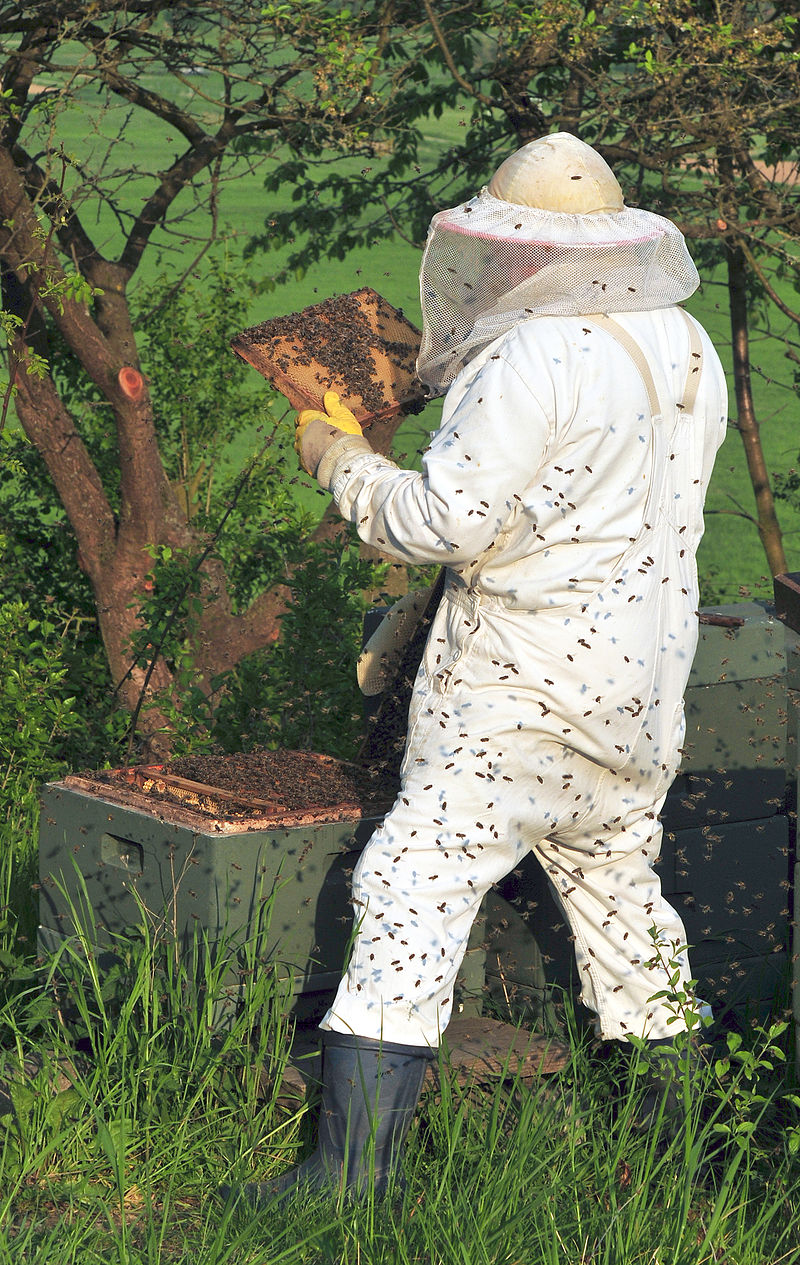
“Beekeeper keeping bees” by Michael Gäbler. Licensed under CC BY 3.0 via Commons https://commons.wikimedia.org/wiki/File:Beekeeper_keeping_bees.jpg
When my dad died, he was acclaimed for his many roles, as a pastor, administrator, family man, and avocational gardener and, not the least, as a beekeeper. We buried him with a Bible on his lap, open to Psalm 119:103: “How sweet are thy words unto my taste! Yea, sweeter than honey to my mouth!”
There was always honey in our house, full gallons in the kitchen, sixty-pound drums in the basement. Mom used it in baking and beans. Dad dolloped it on oatmeal. He commended it as medicinally preventive when a cold was coming on. “Take a spoonful of honey before you go to bed,” he urged. “Just let it slide slowly down your throat.” It not only tasted good; it was good for you.
Once I left home, he supplied all the field-fresh honey I could use. Later I bought it from his protégé. So I’ve never run out of the real-deal, the kind sold at roadside stands. But I’ve been using more of it recently, in simmered beans and blueberry muffins and Moroccan carrot salad. Over the weekend, eager to make a hefty batch of granola—Tom Brokaw’s special recipe—I saw that my honey jar was all but empty even though I’d purchased some on my recent trip “back home.” (Don’t even think about getting through airport security with two pounds of sweet syrup in your satchel. You’ll have to leave it behind.)
I walked through a grocer’s aisle and passed up the Sue Bee and honey bears. I’m distrustful of the commercial processing, flash heated and pressure filtered. So to pacify my inner child, I drove to a nearby farmer’s market. It’s citified. Expensive. But I found what I was looking for, from Pennsylvania fruit orchards, at a price I’d never yet paid. I laid down cash. “I came out especially for this. I couldn’t bring myself to buy it in the store.”
“Thank you,” said the vendor, placing my bill in a box.
I’ve come home satisfied and gratified, especially as I dip a teaspoon, twirl the drip, and lick the sweetness straight from the jar, for a brief moment imagining a sore throat.
Another psalm-line comes to mind, “O taste and see that the Lord is good” (34:8). The sensory image, of tasting God, is a stretch for many Christians who don’t see spiritual nourishment in the Eucharist. (Those who do often sing a lyrical “taste and see” as they receive the host.) We’ve tasted temporal gifts. But tasting God? How’s that?
In her book Craving Grace, Lisa Velthouse notes the Hebrew, rather than later Greek/Western, reliance on figurative language when referring to God—as “a shield, a rock, a king on a throne, a hiding place.” And honey. She describes a rabbi teaching five-year-olds on their first day of school. On each desk he places a new copy of the Torah/Pentateuch. On each book cover he sets a small square of wax paper on which he drizzles a dab of honey. Taste and savor the sweetness. And then with a staccato, booming voice, he admonishes, “‘Never! Forget! What God! Tastes Like!’”
I didn’t grow up thinking of Wonder Bread and grape juice as food for the soul. I grew up singing a sentimental nineteenth-century gospel song grounded in an adjective I just now appreciate at a deeper level: “’Tis so sweet to trust in Jesus” [Louisa Stead, 1882].
I hardly know what it means. But I’m connecting it to my dad’s extracted gold, served at the table raw from the hive. “It’s good for what ails you,” he’d say.
————————————————————————————-
Evelyn Bence”s most recent book is Room at My Table: Preparing Heart and Home for Christian Hospitality. Her personal essays have appeared in the publications including Washington Post, Washingtonian, Christianity Today, and Books & Culture.
